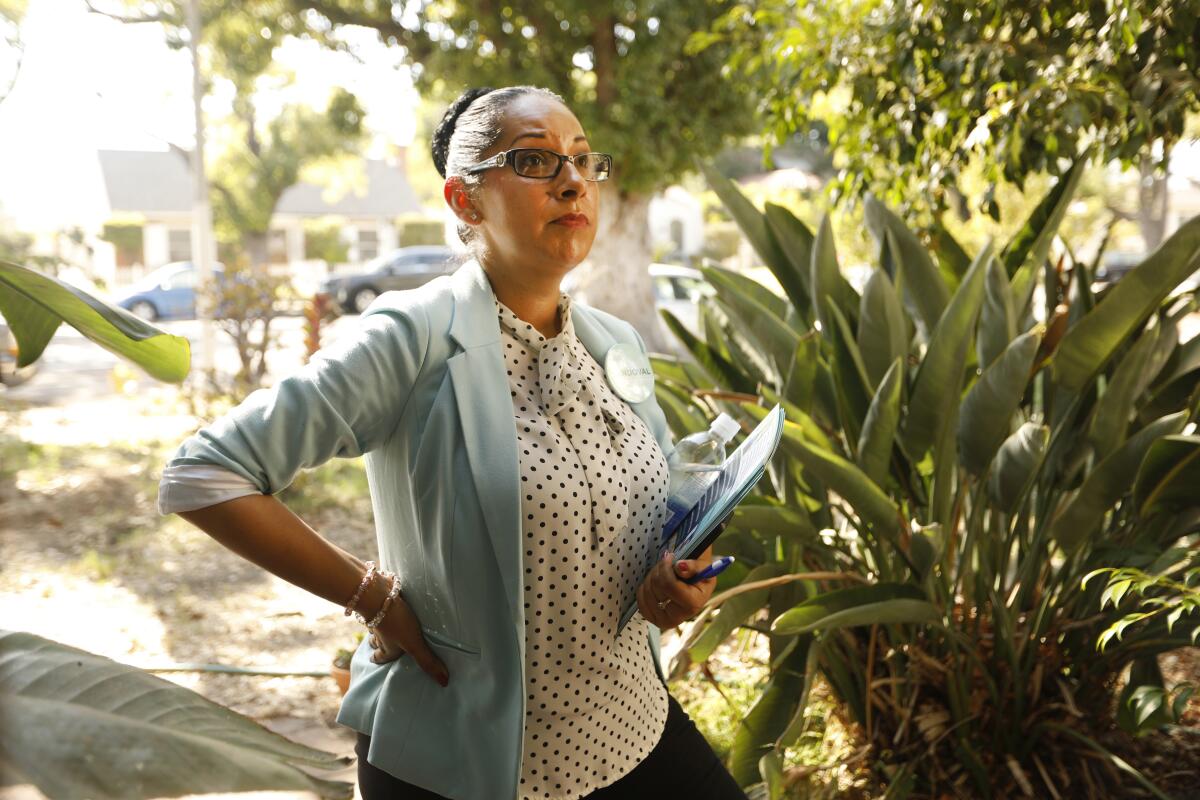L.A. council candidate pays two workers about half the amount owed in wage theft cases

Three weeks ago, Los Angeles City Council candidate Danielle Sandoval issued a public apology, saying she was taking full responsibility for her handling of wage theft claims filed by workers at a restaurant she opened in 2014.
Sandoval said she was working to “remediate the harm” caused to the four former employees of Caliente Cantina in San Pedro, which is now closed.
On Tuesday, Sandoval provided an update on that effort, telling supporters in a video that some payments have now been made. But those workers did not receive the full amount that state labor officials had been trying to collect.
Officials with the Department of Industrial Relations said restaurant workers Isaac Garcia and Alejandro Jaramillo had been owed a combined $9,236, including interest, for the hours they worked. Under a settlement agreement reached with the state labor watchdog, Sandoval paid them a combined $5,052 — about 55% of what was sought.
L.A. City Council candidate Danielle Sandoval, after a week of defiant statements, said she takes “full responsibility” and is working to ensure workers who filed wage claims are paid.
The wage cases have become a serious political issue for Sandoval, who is running in the Nov. 8 election to replace Councilmember Joe Buscaino in a district stretching from San Pedro north to Watts. Her opponent, attorney Tim McOsker, has begun sending campaign mailers criticizing Sandoval for her treatment of her former employees.
McOsker called the settlement agreements “pretty outrageous,” noting that Sandoval previously put $37,000 of her own money into her council bid. Those funds could have gone toward paying her employees the full amount sought by the state, he said.
“These workers shouldn’t be stolen from a second time,” he said.
Sandoval spokesman Rick Thomas said in an email that McOsker, as a lawyer, “knows how this works.”
“Lawyers make an offer, the other side agrees, you settle,” he said.
The Times reported last month that the state’s labor commissioner concluded that Cantina Investments LLC, while doing business as Caliente Cantina, failed to pay four of its employees for work they performed in 2014, a violation of state law commonly known as wage theft. Three of the four workers identified Sandoval as the restaurant’s owner during a 2015 hearing in their cases.
Gregory Richardson, Sandoval’s attorney, said he views the settlement of the two cases as a compromise, with his client paying more than the original set of fines levied in 2015, but less than the amount the state had been seeking in recent months.
Sandoval had said repeatedly that she did not receive proper notification about the cases many years ago. In her video, she said all of the parties in the negotiations — including the two workers — agreed to the final settlement amount in their cases.
“I have taken this head on, battling this in the public eye and in the court of public opinion,” Sandoval said. “And I have the bruises to prove it.”

Paola Laverde, spokeswoman for the state’s Department of Industrial Relations, said negotiated settlements are common in wage theft cases, particularly those filed against a limited liability company. State officials spent seven years seeking payment from Cantina Investments LLC, a company Sandoval helped form in 2014.
Cantina Investments does not have any assets that can be seized, Laverde said. Efforts to collect full payment from owners of a limited liability company have frequently required additional legal filings, causing more delay in collecting outstanding wages, she said.
“Ultimately, these two workers wanted to accept the settlement amount,” Laverde said. “And it is their decision.”
Laverde, whose agency oversees the office of the labor commissioner, said negotiations are continuing on payment for the other two workers, who are owed a combined $13,279. The agency is “still asking for the full amount, but they have not agreed to pay that at this time,” she said.

The four workers filed their complaints in 2014, giving investigators what they said were text messages in which Sandoval acknowledged her workers were owed money. In one exchange, a former Caliente Cantina employee wrote a panicky message to Sandoval about his unpaid wages, according to state officials.
“I really need to get paid I’m a month away from getting kicked out of my house I really need the $$$. pls let me know,” the worker wrote in the text, a copy of which was provided by the state labor commissioner’s office.
The revelations about the 8-year-old wage theft cases have disrupted Sandoval’s council campaign, causing her to lose support from a number of high-profile endorsers.
The Times’ editorial board, which operates separately from the newsroom, rescinded its endorsement this month, as did ACCE Action, the political arm of the Alliance of Californians for Community Empowerment, which advocates for tenants’ rights and low-income communities of color.
“We earnestly hope that Danielle Sandoval learns from these personal errors, and that her future actions reflect a better understanding of the responsibility of the power that she holds,” the group said in a statement.
Ex-employees have pending wage-theft cases against restaurant that was opened by Danielle Sandoval.
The wage theft claims have had a ripple effect in other ways. Labor organizer Hugo Soto-Martinez, who is running for City Council in a Hollywood-area district, said he withdrew from a campaign fundraiser/meet-and-greet last month where he had been scheduled to appear alongside Sandoval.
“Obviously, as a union organizer, anything about wage theft is incredibly serious for me and the campaign,” he said.
Others have stood by Sandoval.
Councilmember-elect Eunisses Hernandez, who will take office in December representing an Eastside district, attended the event, retweeting photos of herself with Sandoval, writing the message “this is what #LatinaLeadership looks like.”
This month, Hernandez told The Times that Sandoval had been working to resolve those cases — and “deserves another chance like everyone else in Los Angeles.”
On Wednesday, a spokesperson for Hernandez said she does not have enough information to weigh in on the settlement agreements.
More to Read
Sign up for Essential California
The most important California stories and recommendations in your inbox every morning.
You may occasionally receive promotional content from the Los Angeles Times.













